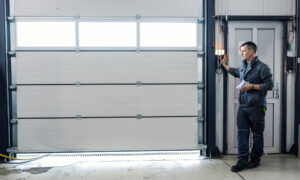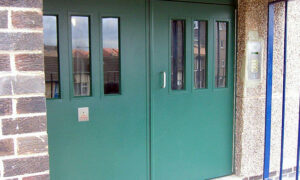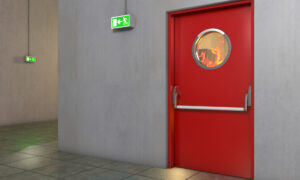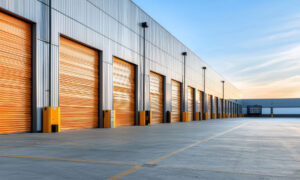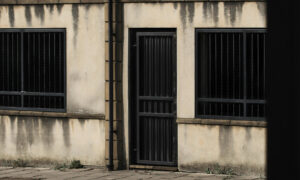If you’re looking for new doors or windows, you may have come across the term PAS24. But what is the PAS24 security standard? And what does it mean for your building security?
Here we’re going to take a look at exactly what PAS24 standards involve. And take a look at some useful building security improvements too.
What is PAS24?
PAS24 is a security standard for windows and door sets.
Products undergo PAS24 testing and, if they achieve the required security performance, they get PAS24 certification. This is proof that products can withstand an attempted break-in.
In September 2022 a new version of PAS24 standards were introduced. It’s often referred to as PAS24: 2022. The previous version, PAS24: 2016, has now been withdrawn.
For manufacturers, installers and testing houses, that means a few changes to the way they do things. But for customers, it’s business as usual, with PAS24: 2022 doors and windows continuing to offer top-level security.
How are PAS24 doors and windows tested?
To achieve PAS24 certification, a door or window manufacturer has to send their products to be tested by an independent testing company. This company must be certified by the United Kingdom Accreditation Service (UKAS).
The testing house will submit products to a range of tests, many of which are designed to replicate known burglary methods in the UK. Here are just a couple of the tests that doors and windows go through.
- Manipulation testing – an inspector tries to break through a door or window by releasing the locks and hinges
- Manual cutting testing – the inspector tries to gain entry by cutting a hole in the door or window
- Mechanical loading testing – using a machine, the inspector applies pressure to door or window, simulating the effect of a crowbar
- Impact testing – the inspector tries to break down the door or window using a 50kg metal battering ram on a pendulum
Only doors and windows that pass all of the required tests are awarded PAS24 certification. These products provide good, albeit not impenetrable, protection against an attempted break-in.
SDS steel doors are tested to PAS24 standards. So you can always count on top-notch security. Check out our high security doors or get in touch to find out more.
9 more ways to improve building security
PAS24 is all about ensuring the best defence against break-ins. But – as well as installing doors and windows that meet PAS24 standards – what else can you do to improve building security?
Here are a few useful ideas.
Install and use an alarm system
An intruder alarm can be set up to notify you – or a monitoring company – in case of a break-in. Visible alarm equipment on the outside of your property also helps to deter burglars.
Remember that thieves are after an easy win. So if your building is well-defended, they’re likely to scope out another prospect.
Assign responsibilities
Who’s responsible for building security? Who locks up at the end of the day? And who takes responsibility for arranging security equipment maintenance?
Assign tasks so everyone knows what security procedures they need to complete, and so no essential jobs end up being missed.
Establish clear security protocols
You should always know who is on your premises at any given time. This will help you to identify intruders more easily.
So, if you don’t already have one, develop a system for logging arrivals and departures.
You could ask employees to wear identification or use key cards to access certain areas within your building. Site visitors should always sign in and carry approved visitor identification.
Employ security personnel
Employ a security guard to patrol your premises day and/or night. They’ll help to deter thieves and can quickly raise the alarm if there’s an attempted break-in.
During the day time, ensuring that a receptionist or other member of staff is sat at your front desk means nobody can slip into your building unnoticed.
Fit CCTV
According to former burglars, CCTV is one of the best burglary deterrents around.
Install cameras in visible locations above entrances and exits, making sure they’re pointing away from any nearby light sources. This will help you to get a clear view of anyone accessing your building.
Install external security lights
Use motion-sensor security lights to illuminate vulnerable windows and doors. A well-lit building perimeter makes it very difficult for a burglar to go unseen. And makes it a lot less likely that anyone will attempt a break-in.
Secure the surrounding area
Traffic barriers help to keep unwanted visitors out of your car park when your premises are closed overnight. For the best building security, pick strong barriers that can be fixed into a locked position.
Also consider the boundary you have in place. Is your fence or wall solid? Does it require repairs? And would barbed wire provide an additional deterrent?
Install extra security for at-risk items
Cash and electronic equipment are often at the top of a burglar’s wish list. So you might want to install additional security solutions for high-value items.
Laptop locks act like a bike lock, securing computers to an immovable object – like a desk that is attached to the floor. And a safe provides a secure place to store cash, vehicle keys and other valuables overnight.
Maintain doors and windows properly
It’s not just a case of installing doors and windows that meet the PAS24 security standard. You need to maintain them properly too.
A regular schedule of inspections and maintenance will help to ensure the security of your doors and windows going forward.
PAS24 certified steel doors from SDS
If you’re looking to improve building security, then take a look at the PAS24 certified steel doors available from Secure Door Systems.
We design, manufacture and install steel security doors for a wide range of premises – including residential, commercial and industrial buildings.
And with both off-the-shelf and made-to-measure options, we’re confident we can provide the perfect solution for your workplace.
Why not get in touch with our expert team for a no obligation quote today?

